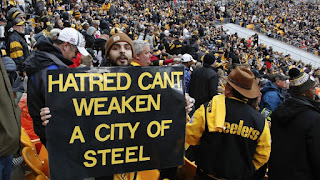While there will be much discussion about gun control in the coming weeks, there's another angle to this story that has many connections to our next unit on dissent. One of the topics we'll be exploring is the role of free speech in America, something that is constitutionally protected for all Americans. One of the questions we'll explore is not simply "what can I say?", but more importantly, "what should I say?" Asking "what can I say?" frequently grounds discussion on free speech in legal terms, but the question "what should I say?" grounds the discussion in an ethical context.
What does speech have to do with the shooting this past weekend? Well, the perpetrator of the crime was known to regularly post hateful, anti-Semitic and racist rants on a social media platform called "GAB." Whether or not he had the right to do so -- and what obligations this platform has towards its users -- is not my main concern in this blog post. What is my main concern is the notion that hateful speech can be a precursor to violence, and that's the kind of speech we need to be wary of. This New York Times editorial focuses on the value of "good speech" and how we need it (especially from our leaders) in times like these.

No comments:
Post a Comment